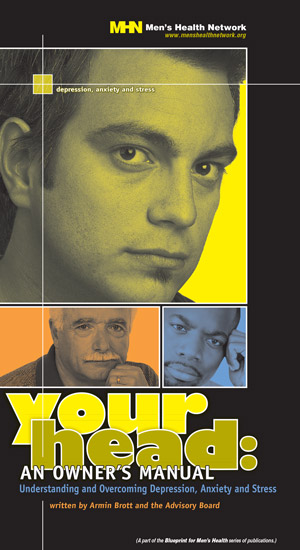Dear Heathy Men: You’ve mentioned several times in this column that men don’t go to the doctor as often as women and that they live shorter, sicker lives than women. I’m sure that’s true. But what I really want to know is why? Why don’t men take better care of themselves?
A: There are a number of factors that keep men (and boys) from being as actively engaged in their own healthcare as they need to be. Here are some of the biggest ones:
- Socialization. When we’re little, boys are bombarded with the idea that “big boys don’t cry.” When we’re in high school, we’re told that we need to “take one for the team.” And when we hit adulthood, it’s “man up.” Overall, the message is clear: asking for and/or accepting help is a sign of weakness. Not surprisingly, men and boys ignore their symptoms and stay as far away from medical providers as they can.
- Media messages. In a comprehensive study of print advertising for health products and healthy lifestyles, Dr. Salvatore J. Giorgianni, Jr. found that ads were half as likely to be directed at males than at females. “This sends a clear message to boys and young men that (a) only women and girls have health-related needs, and (b), taking care of one’s physical or mental health is women’s responsibility,” says Giorgianni, co-founder and vice president of Healthy Men, Inc. (healthymen.org).
- Lack of information/knowledge. One of the main reason males eventually seek medical help is erectile dysfunction (ED), which is often an early symptom of a variety of other health risks. “Seventy one percent of men who have experienced issues related to sexual health, including erectile dysfunction, have also been diagnosed with cardiovascular disease or diabetes,” according to a 2022 study by the Cleveland Clinic. Unfortunately, 58% of men believe that low testosterone is causing their ED, which leads many to shop for quick cures online or elsewhere. The study also found that, “[t]he majority of men don’t know their complete family history when it comes to urological issues (77%) and cancers (64%).”
- The healthcare system is unwelcoming. An earlier (2019) Cleveland Clinic study found that “going to the doctor is so unappealing” that seven in ten men would rather do household chores, like cleaning the bathroom or mowing the lawn, than go to the doctor, and 77% would rather go shopping with their wife or significant other than to the doctor. As a result, about two thirds of men prefer to self-diagnose and the same percentage will wait as long as possible before finally agreeing to see a provider. By then, it’s often too late.
- Some of the blame for men’s experience of being unwelcome and uncomfortable in healthcare settings rests with providers. A majority of men would be more likely to have regular checkups if medical offices had more flexible hours. But even when they do make an office visit, “men receive significantly less physician time in medical encounters than women… and are provided with fewer and briefer explanations,” according to researcher Will Courtenay. And while men are more likely than women “to engage in high-risk behaviors and less likely to adopt health-promoting behaviors,” physicians give them less advice about how to reduce their risk factors.
- That said, men need to take some responsibility. In the 2019 Cleveland Clinic study, about 20% of men admitted that they haven’t been completely honest with their doctor. Major reasons include feeling embarrassed, judged, or uncomfortable; hoping that whatever problem they were having would go away on its own; not wanting to be told to make lifestyle changes; or simply not wanting to know.
Clearly, there’s a lot of work that men, women, and society as a whole have to do to improve male health outcomes. To deal with the healthcare system part of the problem, Healthy Men, Inc. recently developed a Certified Men’s Health Educator program that has been very successful in teaching providers, educators, and others who work with boys and men how to communicate in a male-friendly way that will motivate them to take on a more active role in their own healthcare.




Recent Comments